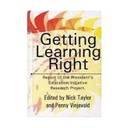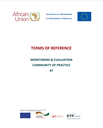
Entire site

Keynote address delivered at Rhodes University PhD Symposium, July 2015 by Yvonne Reed, School of Education, University of the Witwatersrand. Presents an overview of findings from several research studies, including the Initial Teacher Education Research Project (ITERP).
Injini commissioned JET Education Services to conduct an external evaluation of the Injini Africa’s EdTech Incubator programme. The goal of Injini is to improve education outcomes across Africa through supporting EdTech entrepreneurs with solutions that are evidenced-based, effective and scalable, and can address challenges of access and quality. This report presents the results of the external evaluation of Injini Africa’s EdTech Incubator programme, which was conducted from January to March 2019.
Joint Report by SSACI, JET Education Services and the NBI, March 2016
Joint Report by SSACI, JET Education Services and the NBI, March 2016
Paper Presented at the Wits School of Education Research Seminar, Staff Lounge






This M&E Guideline is fundamental for development, implementation and review of NQFs and RQFs including the ACQF. The M&E Guideline is intended as a pragmatic conceptual reference and methodological guidance for NQF and Regional Qualifications Frameworks (RQF) implementers helping them develop and establish functional M&E systems.
We present the impact on learner outcomes of a province-wide Grade R mathematics intervention (termed RMaths) in relation to theoretical frameworks established from a meta-evaluation of evaluations of education interventions in South Africa and a review of other meta-evaluation and synthesis studies. We compare the changes in Mathematics performance from baseline to end line, of learners in the intervention group (taught by R-Maths-trained teachers/practitioners) to the comparison group (learners in schools in the same districts, but whose teachers/practitioners had not yet received the R-Maths intervention). The intervention group performed 2.9 percentage points better than the comparison group over the whole Marko-D test of mathematical competencies, with a small effect size. The greatest effects on performance were from language of learning and teaching, and district. The R-Maths case indicates that a modified cascade model which includes some elements of Fleisch’s “educational triple cocktail” (structured learning materials, teacher training, and support) may be successful by working with, and through, department of education structures. Whether the effects are retained over time and if these effects can be replicated in different contexts is not yet known.




JET Education Services are delighted to announce their partnership with PrivySeal in providing Agile Credentialing Services.

Building social change agents in education research that contribute to the development and application of 21st century models for education that seek to reduce poverty and promote sustainable development.


The Jala Peo (“Plant the Seed”) Initiative is a vehicle for the promotion of nutrition education and school food and nutrition gardens active in 67 schools across three Provinces: the Free State, Limpopo and the Western Cape. The Initiative seeks to make sure every school has a thriving school food and nutrition garden and that all learners in South Africa understand how to produce and consume nutritious food. To do this, the Initiative has created Forums – multistakeholder partnerships of government departments, private sector, academia and NGOs to increase and direct investment and resources towards more effective agriculture and nutrition education.

The Jala Peo (“Plant the Seed”) Initiative is a vehicle for the promotion of nutrition education and school food and nutrition gardens active in 67 schools across three Provinces: the Free State, Limpopo and the Western Cape. The Initiative seeks to make sure every school has a thriving school food and nutrition garden and that all learners in South Africa understand how to produce and consume nutritious food. To do this, the Initiative has created Forums – multistakeholder partnerships of government departments, private sector, academia and NGOs to increase and direct investment and resources towards more effective agriculture and nutrition education.

The Jala Peo (“Plant the Seed”) Initiative is a vehicle for the promotion of nutrition education and school food and nutrition gardens active in 67 schools across three Provinces: the Free State, Limpopo and the Western Cape. The Initiative seeks to make sure every school has a thriving school food and nutrition garden and that all learners in South Africa understand how to produce and consume nutritious food. To do this, the Initiative has created Forums – multistakeholder partnerships of government departments, private sector, academia and NGOs to increase and direct investment and resources towards more effective agriculture and nutrition education.
The Jala Peo (“Plant the Seed”) Initiative is a vehicle for the promotion of nutrition education and school food and nutrition gardens active in 67 schools across three Provinces: the Free State, Limpopo and the Western Cape. Your school food and nutrition garden is a living thing. And just like you and me, it needs to be nurtured for it to grow. It needs to be planned for.

The Jala Peo (“Plant the Seed”) Initiative is a vehicle for the promotion of nutrition education and school food and nutrition gardens active in 67 schools across three Provinces: the Free State, Limpopo and the Western Cape. The Initiative seeks to make sure every school has a thriving school food and nutrition garden and that all learners in South Africa understand how to produce and consume nutritious food. To do this, the Initiative has created Forums – multistakeholder partnerships of government departments, private sector, academia and NGOs to increase and direct investment and resources towards more effective agriculture and nutrition education.


JET ANNUAL MEETING AND 30TH ANNIVERSARY CELEBRATION: 30 years behind us and looking towards the future

Education Interventions in Kakuma Refugee Camp: A place for modern technology? Field Report:
Presentation to the QQI conference The Digitalisation Agenda: Rethinking the role of qualifications and skills. Dublin, 24 October, 2017
JET Education Services (JET), in collaboration with the Manufacturing, Engineering, and Related Services Sector Education and Training Authority (merSETA), has initiated a programme (PSET CLOUD) that seeks to address the development of an integrated national digital ecosystem that is interoperable and can be used for effective skills planning and provisioning.

A policy maker's handbook for more resilient systems by OECD

Newsletter of the National Association of Social Change Entities in Education (NASCEE) @WORK
On 22 April 2020, a virtual meeting involving over 80 individuals gathered to hear first-hand from the Department of Basic Education the plans being put in place to support learners and teachers during the COVID-19 pandemic period.

The fourth edition of NORRAG Special Issue (NSI), published in April 2020, is entitled “New Philanthropy and the Disruption of Global Education.” NSI 04 aims to analyse the disruptive nature of “new philanthropy” and its role in the changing landscape of global education and development. Dr Rooksana Rajab contributed to the NSI 04 publication consisting of 31 articles which aim to highlight global and national experiences, as well as diverse perspectives on the role and function of new philanthropy in education. It seeks to expand the debate and foster dialogue, bridge the gap between theory and practice, as well as stimulate new research, advocacy and policy innovation in international education development.
Elisabeth Henning, Lyn Teixeira, Roelien Herholdt, Nozipho Motolo, Hanrie de Villiers. Presented at the South African Research Association for Early Childhood Education Conference, 2014.

Reos Partners and JET Education Services are embarking on a process to combine their expertise to address systemic challenges in the education sector. Together, they have identified the potential lever of parental (or caregiver involvement)1 in education as an opportunity to significantly improve educational outcomes, particularly in the Foundation Phase of the child’s development.
